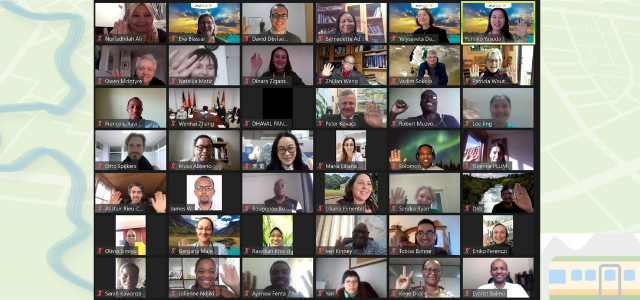The series is connected to the Massive Open Online Course (MOOC) on Governance for Transboundary Freshwater Security. In her opening remarks, GWP Senior Network & Transboundary Water Cooperation Specialist Yumiko Yasuda said, “Since opening the course in August 2020, it has attracted over 1,600 participants. This confirms the need and interest in learning about this subject.”
The 2021 interactive event series was initiated to deepen the engagement with the MOOC participants, giving them the opportunity to engage with experts in the field and enhance their learning experience.
“In this series, we will be highlighting not only the topic of transboundary freshwater governance, but also highlight various examples and expertise from different locations around the globe,” said Yasuda.
The first event consisted of presentations by experts from Africa, Europe, and Central Asia, followed by Q&As based on some of the pre-submitted questions. After this, 15-minute breakout groups gave participants an opportunity to ask questions and share their experiences.
Event Co-Chair Patricia Wouters is the Director of the International Water Law Academy at Wuhan University and a former member of GWP’s Technical Committee. She explained that the main aim was to look for answers on the ‘Why, What and How’ of transboundary water agreements, always through a legal lens. Co-Chair David J Devlaeminck is a Lecturer at the School of Law, Chongqing University, and he introduced the three panel speakers.
Bernadette Adeji, Chief Legal Officer of the Water Resources Commission of Ghana, explained why transboundary agreements are important: “They create a tool for cooperation and enables riparian states to manage, use and share jointly owned resources.”
Péter Kovács, Water Director in the Hungarian Ministry of Interior, shared experiences from a Hungarian perspective: “Our major problem is that we have a big volume of water in one or very few countries for everyday use – this is why we need transboundary cooperation; it is an obligation. And it is important to highlight the different levels we have on water cooperation: bilateral, multilateral, European level, and global level cooperation.”
Dinara Ziganshina from the Scientific-Information Centre ICWC in Uzbekistan spoke about the Central Asian experience: “I think we’re ahead of many other transboundary basins, because we do have treaties, and we also have a river basin organisation, so we have something to share - in addition to challenges, I think we also have achievements.”
Watch the full recording of the session:
(please note that the breakout sessions were not recorded, but this recording offers a verbal summary of what was discussed in each group).
Coming up:
The Transboundary Freshwater Security Governance Train continues to make more stops, with a total of five more sessions until June. These are the planned events (please note that changes may still occur in the dates/topics):
- Session 2: IWL & Protection of Ecosystems (16 February 2021): Would a stronger focus on protecting ecosystems of international watercourses help avoid potential conflicts or address existing disputes?
- Session 3: IWL, Transboundary Water Cooperation and the Role of Institutions (16 March 2021): How is transboundary water cooperation facilitated in international law? What legal processes contribute to hydro diplomacy on the ground? What options do States have when they disagree over how a transboundary watercourse should be utilized and/or protected?
- Session 4: IWL & Climate Change (20 April 2021): What strategies are there to help countries adapt to/tackle climate change within a transboundary contact? What are the legal challenges and how can national, regional and global legal requirements be addressed?
- Session 5: IWL & Infrastructure Projects (18 May 2021): What are the legal rules and procedures for building major infrastructure? How does international water law, human rights and international investment law combine to deal with these issues?
- Session 6: IWL & Groundwater (15 June 2021): How is transboundary groundwater governed – what are the legal rules that apply and how to implement these in practice? Focus on existing best practice and key challenges.
Background:The MOOC on Governance for Transboundary Freshwater Security opened in August 2020 by GWP, GEF IW:Learn, and Partners. The aim is to bring together countries that share freshwater resources – giving them the skills to cooperate so that the shared resource is managed sustainably for the benefit of each country’s population. The self-paced MOOC is available on the SDG Academy platform - it is free and open to everyone - but especially designed for professionals who manage and make decisions about transboundary waters.

